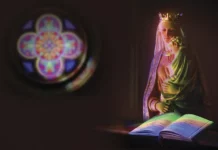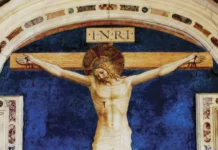The imposing maritime vista urged the Christian squadrons to advance on that historic morning of October 7, 1571. Over four centuries later, what lesson can we draw from the greatest naval battle of all time?
Serene, impassive and glorious, the waters of the Gulf of Lepanto still fascinate the eyes and minds of those who roam its shores, wondering what stories that extraordinary place could tell. But this enchantment cannot be traced to Homer’s inspirations or to the brilliance of Aristotle’s reasoning, which once radiated from Greece to later conquer the world.
In this imposing maritime scene marked by the winds of heroism, the morning of October 7, 1571, dawned decisive, instilling the Christian squadrons gathered there with a great resolution to advance. The prayers of the Supreme Pontiff, together with the strong arm of “a man sent from God, whose name was John” (Jn 1:6), conquered the heavens, moved the earth and set out on the seas assuming the character of a battle, until being crowned with a magnificent triumph! On those waters, many proudly gave their lives in defence of something dearer than the dreams of youth and more sacred than the light of their own eyes: the freedom of the Holy Roman Catholic Church.
A certain prophetic intuition had caused St. Pius V to repeatedly advise them to continue fearlessly, for he himself, in the name of God, assured them of victory. The Pope was a venerable man who, in the autumn of his life, was witnessing an unprecedented persecution being unleashed upon Christendom, and whose faith, subject to the fire of trials (cf. 1 Pt 1:7), never waned before the adversary.
Armed with courage, the austere sexagenarian began vigils of prayer, fasting and penance, pleading with Mary Most Holy, Our Lady of the Rosary and the Help of Christians, for the salvation of the flock under threat. What transpired between Our Lady and him during these long exchanges? The matter is shrouded in mystery to this day. In his capacity as the visible head of the Mystical Bride of Christ, holder of the keys and depository of the Church’s promise of immortality (cf. Mt 16:18-19), the Successor of Peter moved the Immaculate Heart of Mary and, as a consequence, the course of history.
Guided by supernatural lights, St. Pius V sent out a convocation among the Catholic kingdoms for a fulminating attack, being followed only by the most fervent. To them he expressed the anguish of his soul as Pastor, but above all the certainty of the success that had already mystically been assured him.
At the same time, he discerned a very lofty call in the younger son of Emperor Charles V, who at the time was only twenty-four years of age, who appeared to be cut out by God for feats and daring worthy of great heroes. Without hesitation, he placed him at the head of the most experienced men of war with this single watchword: advance!
In his capacity as the visible head of the Mystical Bride of Christ, St. Pius V moved the Immaculate Heart of Mary and, as a consequence, the course of history. His prayers together with the strong arm of John of Austria were crowned with a magnificent triumph!

From the beginning, an ineffable promise of glory accompanied the undertaking, the fruit of the motherly gaze of the Blessed Virgin who would come personally to complete the work begun by the manly strength of her combatant sons.
More than four centuries after the greatest naval battle of all time, our Catholic soul draws from the great lesson of Lepanto the certainty that the future crossroads, though fearsome, will never succeed in impeding heavenly intervention. The symbolic, miraculous and paradigmatic character of this intervention is indelibly represented in the exploit headed by the Captain General Don John of Austria.
Perhaps even today this gulf of epic beauty is still the dwelling place of the Angel who led the Christian armada on “the most memorable and sublime episode ever contemplated by previous centuries.”1 With his warlike presence he seems to caress the shoreline, to move the waters and to inspire within those who contemplate them this certainty: “Today’s victory, like that of yesterday, is reserved for those who know how to raise to God’s throne the cry born of an intrepid faith in the deepest recesses of their hearts: Auxilium Christianorum, ora pro nobis!” ◊
Note
1 CERVANTES SAAVEDRA, Miguel de. Novelas ejemplares, Prologue.







